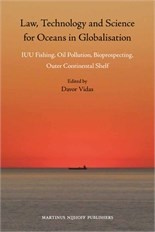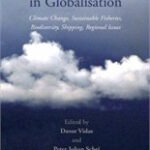Author
Davor Vidas (editor)
Publication Year
2010
Source
Martinus Nijhoff Publishers /Brill Academic Publishers
xxxiv+608 pages
This is the first of the two books resulted from an international conference ‘The World Ocean in Globalization: Challenges for Marine Regions”, hosted by the Fridtjof Nansen Institute (FNI) on 21-23 August 2008. Many of the chapters are updated and refined versions of papers delivered at that conference, supplemented by chapters on additional key topics. As is stressed in the Preface by Davor Vidas “Our objective has gone beyond merely preparing a set of conference proceedings. We have aimed to produce two related, highly integrated volumes that present a state-of-the-art report on many legal and policy issues for seas and oceans that have been emerging in the wake of increasing globalisation”.
| TABLE OF CONTENTS |
List of Acronyms and Abbreviations; List of Figures; List of Tables; Notes on Contributors; Preface Davor Vidas; Acknowledgements.
Part I: THE WORLD OCEAN IN THE ANTHROPOCENE EPOCH
1 Responsibility for the Seas Davor Vidas; 2 The Development of the Law of the Sea since the Adoption of the UN Convention on the Law of the Sea: Achievements and Challenges for the Future Tullio Treves; 3 Major Challenges of Globalisation for Seas and Oceans: Legal Aspects Vladimir Golitsyn.
Part II COMBATING IUU FISHING: REGULATORY FRAMEWORK AND USE OF TECHNOLOGY
4 Occupying the High Ground: Technology and the War on IUU Fishing Denzil G.M. Miller; 5 Monitoring, Control and Surveillance Tools to Detect IUU Fishing and Related Activities Michele Kuruc; 6 Combating IUU Fishing: Interaction of Global and Regional Initiatives Terje Lobach; 7 FAO Action to Combat IUU Fishing: Scope of Initiatives and Constraints on Implementation David J. Doulman; 8 Developing a Model for Improved Governance by Regional Fisheries Management Organisations Michael W. Lodge; 9 IUU Fishing in Antarctic Waters: CCAMLR Actions and Regulations Denzil G.M. Miller, Natasha Slicer and Eugene N. Sabourenkov; 10 Using Technology in Combating IUU Fishing: The Potential of Satellite Remote Sensing Neil Ansell, David Ardill and Harm Greidanus.
Part III ILLEGAL OIL SPILLS FROM SHIPS: INTERACTION OF TECHNOLOGY AND LAW
11 Illegal Oil Spills from Ships: Monitoring by Remote Sensing Olaf Trieschmann; 12 Monitoring Oil Pollution from Ships: Experiences from the Northern Baltic Practice Kati Tahvonen; 13 Illegal Oil Discharges from Ships and Implementation Failures in the International Convention System Z. Oya ?z?ayir; 14 United States Criminal Enforcement of Deliberate Vessel Pollution: A Document-Based Approach to MARPOL Richard A. Udell; 15 The EU Ship-Source Pollution Directive and Recent Expansions of Coastal State Jurisdiction Alan Khee-Jin Tan.
Part IV MARINE GENETIC RESOURCES AND BIOPROSPECTING
16 Is the UN Convention on the Law of the Sea the Legal Framework for All Activities in the Sea? The Case of Bioprospecting Tullio Scovazzi; 17 Regulating Uses of Marine Biodiversity on the Outer Continental Shelf Joanna Mossop; 18 Some Reflections on Bioprospecting in the Polar Regions Harlan Cohen; 19 International Law and the Genetic Resources of the Deep Sea David Leary; 20 Exploiting Marine Genetic Resources beyond National Jurisdiction and the International Protection of Intellectual Property Rights: Can They Coexist? Richard J. McLaughlin; 21 Marine Genetic Resources in Areas Beyond National Jurisdiction and Intellectual Property Rights Salvatore Arico; 22 Evolving Perspectives on the International Seabed Area’s Genetic Resources: Fifteen Years after the ‘Deepest of Ironies’ Lyle Glowka.
Part V CONTINENTAL SHELF BEYOND 200 NAUTICAL MILES
23 A Note on Submissions and Preliminary Information on the Continental Shelf Beyond 200 Nautical Miles Davor Vidas; 24 The Continental Shelf Beyond 200 Nautical Miles – a Crucial Element in the ‘Package Deal’: Historic Background and Implications for Today Carl August Fleischer; 25 The Work of the Commission on the Limits of the Continental Shelf Vladimir Jares; 26 Submissions on the Outer Limit of the Continental Shelf: Practice to Date and Some Issues of Debate Frida M. Armas-Pfirter; 27 The Outer Continental Shelf in the Arctic Ocean: Legal Framework and Recent Developments Ted L. McDorman; 28 Towards Setting the Outer Limits of the Continental Shelf in the Arctic: On the Norwegian Submission and Recommendations of the Commission ?ystein Jensen; 29 The Outer Continental Shelf in the Asia-Pacific Region: Progress and Prospects Clive Schofield, Andi Arsana and Robert van de Poll; 30 The Outer Continental Shelf and South American Coastal States Maria Teresa Infante.
Index of Treaties and Other International Instruments; Subject Index.
About the author

Davor Vidas
Research Professor and Director of the Law of the Sea Programme at the Fridtjof Nansen Institute, Norway. He is the Chair of the ILA International Committee on International Law and Sea Level Rise, and a member of the Anthropocene Working Group of the International Commission on Stratigraphy. He has led many international research projects on various aspects of international law. His recent authored or edited books include The World Ocean in Globalisation (Brill, 2011), Law, Technology and Science for Oceans in Globalisation (Brill, 2010), Croatian-Slovenian Delimitation (?kolska knjiga, 2009), and Protecting the Polar Marine Environment (Cambridge University Press, 2006/2000).




